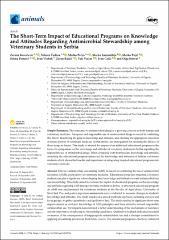The Short-Term Impact of Educational Programs on Knowledge and Attitudes Regarding Antimicrobial Stewardship among Veterinary Students in Serbia

View/
Date
2024Author
Kovačević, Zorana
Čudina, Nikola
Pećin, Marko
Samardžija, Marko
Pajić, Marko
Pintarić, Selma
Vlahek, Ivan
Ružić, Zoran
Vračar, Vuk
Galić, Ivan
Horvat, Olga
Metadata
Show full item recordAbstract
Effective antimicrobial stewardship (AMS) is crucial for combating the rise of antimicrobial
resistance (AMR), particularly in veterinary medicine. Educational programs targeting veterinary
students can play a significant role in shaping their knowledge and attitudes toward antimicrobial use
and stewardship. This study aimed to evaluate the impact of educational programs on the knowledge
and attitudes regarding AMS among veterinary students in Serbia. A structured educational program
on AMS was implemented for veterinary students at the Faculty of Agriculture, University of
Novi Sad. Pre- and post-symposium assessments were conducted to measure changes in students’
knowledge and attitudes. The study employed a mixed-methods approach, including surveys and
focus groups, to gather quantitative and qualitative data. The study resulted in significant short-term
improvements in students’ knowledge of AMS principles and their attitudes toward responsible
antimicrobial use. Participants demonstrated a better understanding of the mechanisms of resistance
and the importance of adhering to stewardship guidelines. Qualitative feedback indicated increased
awareness of the consequences of inappropriate antimicrobial use and a stronger commitment to
applying stewardship practices in their future careers. The educational programs effectively enhancedimmediate veterinary students’ knowledge and attitudes regarding AMS. These findings underscore
the importance of integrating targeted educational programs into veterinary curricula to promote
responsible antimicrobial use and combat resistance in veterinary practice.
